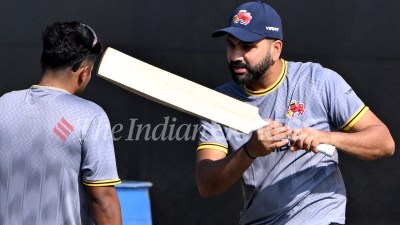📣 For more lifestyle news, click here to join our WhatsApp Channel and also follow us on Instagram
‘Never understood the idea of purity in art’: Harish Shivaramakrishnan on progressive Carnatic music
"We don't need to argue over pure music, just need to spend time listening to more music and learning about the art," Shivaramakrishnan said.
 Bringing Carnatic music to a broader, more diverse audience has been rewarding, says Harish Shivaramakrishnan. (agamtheband/Instagram)
Bringing Carnatic music to a broader, more diverse audience has been rewarding, says Harish Shivaramakrishnan. (agamtheband/Instagram)When it comes to progressive rock in India, Agam has carved a unique niche by fusing Carnatic music with the genre. Led by the multi-faceted Harish Sivaramakrishnan—who also serves as the head of design at Kunal Shah’s CRED—the band has become a trailblazer in the country’s music scene. Fans are eagerly awaiting Agam’s upcoming performance at the Kutti edition of South Side Story music festival in Mumbai on December 14, following their much-acclaimed set at the festival’s Delhi edition in September. Ahead of this highly anticipated event, indianexpress.com caught up with Sivaramakrishnan to discuss the band’s journey, their creative process, and his dual life as a designer and musician.
Q: Experimenting with carnatic music means breaking conventions and formats. And you have done this for years. Elaborate on that, please?
Harish Sivaramakrishnan: Nothing we do is premeditated. I believe every art form is open to improvisation, and the aim isn’t to break it but to layer our interpretation onto it. Over time, this has led to a style that deviates from the conventional classical music, but this evolution wasn’t deliberate. We never set out to change, break, or create something new—it unfolded organically. As time passes, audiences have grown more open to fresh interpretations and experimental sounds. True innovation isn’t forced; it emerges naturally, as it did with us.
Q: You’ve brought Carnatic music to both ardent followers and those less familiar with it, but faced criticism about originality. How do you handle that?
Harish Sivaramakrishnan: As creators, we receive both appreciation and criticism. No art resonates with everyone, and criticism helps us reflect and improve. Artistic feedback has been invaluable in our evolution as musicians, and we’re grateful for it. Change often meets resistance, as people are conditioned to familiar norms. Our role as artists is to acknowledge this resistance while staying true to our vision.
Bringing Carnatic music to a broader, more diverse audience has been rewarding. We’re grateful our efforts broke barriers and reached new listeners, resonating with them. That’s the essence of being an artist—expanding the reach of your art and connecting with people in new ways.
Q: Progressive rock is known for its complexity in lyrics, composition, and direction. Can you explain your process?
Harish Sivaramakrishnan: Every genre has its own grammar and vocabulary, and progressive rock stands out for its compositional integrity and time signatures. It’s a style we enjoy and naturally blend with influences like Carnatic classical music. Most of us in the band are inspired by the great bands that came before us and created progressive rock music.
Listeners often engage emotionally rather than analytically. While some critics dissect the intricacies, most audiences simply seek enjoyment and connection. Through progressive rock, we aim to entertain and evoke feelings without overwhelming listeners with its technical depth.
Q: There is a lot of puritanism associated with Carnatic music, and initially, you faced a lot of criticism. What’s your take on that?
Harish Sivaramakrishnan: Every artist faces criticism, and there are always people who are furious, while others want to see how differently you can approach the art. It’s not unique to Carnatic music; it’s a side effect of being in art. There’s always a diversity of opinion in the way people pursue art.
We don’t really know what is pure. Most of our understanding of purity in music is anecdotal—someone told us this is pure, and it is passed down through generations. There’s no empirical way to tell what is pure music. I only know music the way it was taught to me and the way I hear it. For me, I never understood the idea of purity in art. We don’t need to argue over this, just need to spend time listening to more music and learning about the art.
Q: How do you juggle pursuing music with a full-time, hectic job?
Harish Sivaramakrishnan: It’s tough, but it’s a function of wanting to make it work. Our parents, especially working mothers in the 80s and 90s, managed far more. For me, it’s just performing on weekends and working during the week—nothing extraordinary. We’re passionate about music and committed to making the most of this opportunity. Instead of saying it’s impossible, we’re saying, ‘Let’s try it.’ While we have the time, energy, health, and privilege, we’re simply doing our best to keep the journey alive.
Q: Agam has been together for a long time. How do you handle conflicts within the band while keeping the group united and the creativity flowing?
Harish Sivaramakrishnan: Conflicts are natural in any creative group, and our band is no exception. However, our foundation isn’t reliant on one person acting as the glue—it’s our shared passion for creating and advancing art that keeps us together. Over the past 17 years as a band—and more than 20 years as friends—we’ve learned to navigate and even celebrate our differences. Each member brings unique perspectives, shaped by their personalities, aspirations, and political views, which can spark creative dissonance.
What keeps us united is the camaraderie we’ve built over years of playing and making music together. Our shared sense of the kind of music we want to create ensures that our differences enhance rather than hinder our work. This mutual respect and understanding have allowed us to coexist and thrive as a group, resolving conflicts with experience and a common goal. Ultimately, everything comes together, and we’re deeply grateful for the journey we’ve had and the milestones we’ve reached as a band.
Q: How did songs like Swans of Saraswati come about?
Harish Sivaramakrishnan: Our songwriting process isn’t rigid or defined. Each member of the band comes with varied influences, and our shared love for progressive rock acts as the foundation. My Carnatic music training, for example, adds a distinct layer to our sound, which none of us planned—it just evolved naturally. When creating songs, we usually start with a rough idea of the sound we want, but the music often takes shape organically during the creative process. Swans of Saraswati was born in this fluid, collaborative way, embodying the diverse backgrounds and strengths each of us brings to the table.
Q: What inspired the folk-influenced Kothu Over Coffee?
Harish Sivaramakrishnan: The song’s roots lie in a serendipitous discovery during a trip when our keyboardist, Swami, found a CD of Scottish folk music. The pentatonic scales used in Celtic, Irish, and Scottish music struck a chord with us because of their similarity to Indian classical music. Inspired by this, we experimented with layering Tamil folk percussion in place of Celtic bodhran drums, layering them with guitars and choral arrangements. The process took nearly three and a half years, as we hesitated, unsure of how the audience would respond. However, when we performed it live, the positive reception and the way audiences joined in on the chorus reaffirmed our efforts. It’s now a song that resonates deeply with both us and our listeners.
Q: Who are your favorite musicians or bands?
Harish Sivaramakrishnan: That’s very hard to say. There are so many musicians, but my all-time favorite musician is Ghulam Ali. My all-time favorite Indian musician is Hariharan, and my favourite composer is A R Rahman. Internationally, Dream Theater is my favorite band.
📣 For more lifestyle news, click here to join our WhatsApp Channel and also follow us on Instagram
- 01
- 02
- 03
- 04
- 05



























